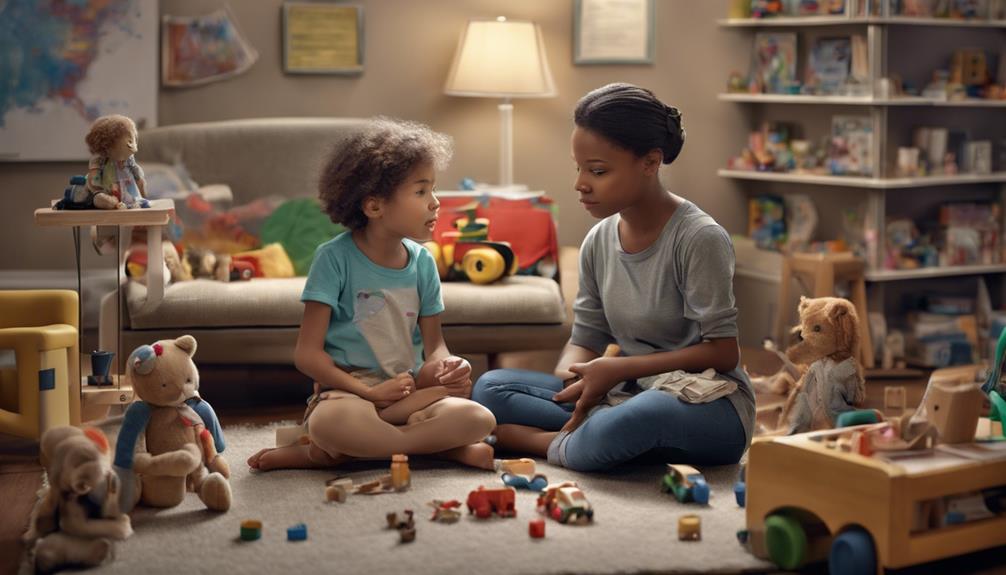Going through the challenges of divorce and getting remarried is like watching a ship sail through a storm – facing turbulent waves hitting its sides, testing the strength of its construction.
Yet, just like a sturdy vessel, our children need support and guidance to navigate through these choppy waters.
Let's explore ten ways to provide them with the stability and reassurance they need during these challenging times.
Key Takeaways
- Open communication and emotional validation are crucial for children's understanding and trust.
- Consistent routines and stability provide a sense of security and normalcy post-divorce.
- Honest conversations and age-appropriate information reduce confusion and anxiety in children.
- Collaborative parenting efforts and professional support enhance emotional adjustment and resilience.
Open Communication Channels
In times of divorce and remarriage, maintaining open communication channels with children is crucial for fostering understanding and providing emotional support. Parents play a vital role in creating a safe and open environment where children feel comfortable expressing their emotions and asking questions. By engaging in honest and age-appropriate conversations, parents can help alleviate confusion and reassure children during these transitions. Clear and direct communication is key in helping children navigate the changes that come with divorce and remarriage. By actively listening to their concerns and providing them with information, parents can help manage children's expectations and offer the support they need.
Establishing open lines of communication not only promotes a sense of connection but also helps children feel valued and heard amidst the shifting family dynamics. By creating a safe space for children to share their feelings, parents can provide a sense of security and stability during these challenging times. Encouraging dialogue and being emotionally available can go a long way in helping children cope with the changes that divorce and remarriage bring.
Validate Children's Emotions

Acknowledging and validating children's emotions during divorce and remarriage is essential in helping them feel heard and understood. Children may experience feelings of loss, confusion, guilt, and worry during this challenging time. By acknowledging these emotions, we can validate their experiences and provide them with a sense of security.
It's important to create a safe space where children feel comfortable expressing their feelings without fear of judgment. Validating their emotions fosters trust and open communication, strengthening the parent-child relationship. When children feel validated, they're more likely to adjust positively to the changes in the family dynamic.
Maintain Consistent Routines
Understanding and validating children's emotions is crucial during divorce and remarriage; now let's address the importance of maintaining consistent routines to provide stability and predictability for them.
Children whose parents divorce often experience a whirlwind of emotions and uncertainties. By establishing consistent routines, such as regular meal times, bedtime rituals, and study schedules, we can create a sense of normalcy in their lives. Clear expectations and stable environments help children feel secure and grounded amidst the changes in their family dynamics. Predictable routines ease children's minds and offer them a sense of stability during times of transition.
It's essential to maintain consistent rules and discipline across households post-divorce to promote a stable environment for children. By avoiding spoiling them and sticking to regular routines, we can provide a sense of structure that's comforting and reassuring. Remember, maintaining consistent routines is a powerful way to support children through the challenges of divorce and remarriage.
Offer Reassurance and Love

During times of divorce and remarriage, offering reassurance and love to children is paramount in helping them feel secure and supported through the emotional journey ahead. As caregivers, we understand the importance of providing a nurturing environment where children feel valued and cherished. Here are three ways to effectively offer reassurance and love to children during this challenging time:
- Open Communication: Encourage children to express their feelings and thoughts openly without judgment. Listening attentively and validating their emotions can reassure them that their voices are heard and respected.
- Physical Affection: Hugs, cuddles, and physical touch can convey love and support in a tangible way, helping children feel connected and comforted during periods of uncertainty.
- Consistent Reassurance: Continuously remind children of your unwavering love and commitment to their well-being. Reassure them that they aren't to blame for the divorce and that they're deeply cared for, no matter the circumstances.
Provide Age-Appropriate Information
When supporting children through divorce and remarriage, it's vital to offer honest conversations tailored to their age for better understanding.
Clear explanations that match their developmental stage can help alleviate confusion and reduce anxiety.
Honest Conversations About Divorce
Engaging in open and honest discussions with children about divorce involves tailoring the information to their age and emotional readiness. It's crucial to provide age-appropriate explanations to help children navigate this challenging time.
Here are some ways to help children through honest conversations about divorce:
- Encourage questions: Create a safe space where children feel comfortable asking questions about the divorce. Answer them honestly and reassure them that it's okay to have mixed emotions.
- Use simple language: Break down complex concepts into simpler terms based on your child's age and comprehension level. Avoid using confusing or adult language.
- Validate feelings: Acknowledge and validate your child's emotions, letting them know it's normal to feel upset, confused, or even relieved. Offer support and understanding as they process their feelings.
Clear Explanations for Children
Tailoring explanations about divorce and remarriage based on children's age is essential to ensure their comprehension and reduce confusion. Using simple and honest language is key when discussing changes in family dynamics with children. It's important to repeat reasons for divorce and remarriage to clarify misunderstandings and offer reassurance. By avoiding overwhelming children with unnecessary details and focusing on key information, we can help them navigate these changes. Providing age-appropriate explanations is crucial for children to process and adjust to shifts in their family structure. Here's a helpful table to guide you in tailoring explanations based on children's age:
| Children's Age | Approach |
|---|---|
| Preschoolers | Use simple language and reassure them that they are loved. |
| School-Age | Offer more detailed explanations and encourage questions. |
| Teenagers | Provide honest information and discuss emotions openly. |
Foster Positive Relationships

Let's focus on nurturing strong connections by engaging in bonding activities that create special moments and memories.
By keeping communication channels open, we can ensure that children feel heard and supported during this challenging time.
Establishing trust and respect within the family unit lays a solid foundation for positive relationships to flourish.
Encouraging Bonding Activities
To encourage positive relationships within the family, prioritize engaging in regular bonding activities that foster connection and create lasting memories. Here are three ways to strengthen the parent-child bond and promote family unity:
- Engage in Regular Family Bonding Activities: Organize game nights, outdoor adventures, or movie marathons to spend quality time together and build stronger connections.
- Encourage Shared Hobbies or Interests: Foster a sense of closeness by exploring activities that both parents and children enjoy, creating common ground for bonding.
- Participate in Special Traditions or Rituals: Establishing family rituals or traditions provides stability during transitions, strengthens the family bond, and offers a sense of continuity and comfort for everyone involved.
Open Communication Channels
Encouraging open communication channels between parents and children is vital for fostering positive relationships and providing crucial support during the challenges of divorce and remarriage transitions. When parent-child communication is open and honest, children have the opportunity to express their emotions, aiding in emotional processing and understanding. This dialogue helps in building strong family bonds and creating a safe space for children to voice their concerns. Below is a table summarizing the benefits of open communication channels in supporting children through divorce and remarriage:
| Benefits of Open Communication Channels |
|---|
| Facilitates emotional processing |
| Strengthens family bonds |
| Supports children through transitions |
Establishing Trust and Respect
Building trust and respect with step-parents is essential for nurturing positive relationships following a divorce. When it comes to supporting children through this transition, fostering these connections is crucial. Here are three practical ways to establish trust and respect in the blended family dynamic:
- Encourage Open Communication: Create a safe space where children feel comfortable expressing their thoughts and emotions. This helps in building understanding and empathy between children and step-parents.
- Set Boundaries Together: Establishing clear boundaries and expectations can promote mutual respect. Involving children in this process can make them feel valued and heard.
- Celebrate Achievements: Acknowledge and celebrate milestones and achievements within the blended family. This helps strengthen bonds and build a positive environment based on trust and respect.
Encourage Self-Care Practices

Practicing self-care amidst divorce or remarriage is crucial for parents to effectively navigate stress and model healthy coping strategies for their children. Engaging in self-care activities such as exercise, healthy eating, and socializing can significantly enhance parents' well-being, enabling them to provide better support to their children during challenging times. Here are some practical self-care practices that parents can incorporate into their routine:
| Self-Care Practices | Description | Benefits |
|---|---|---|
| Exercise | Regular physical activity | Boosts mood and reduces stress levels |
| Healthy Eating | Nourishing and balanced diet | Improves energy levels and overall health |
| Socializing | Spending time with loved ones | Provides emotional support and connection |
Seek Professional Support When Needed

If you're finding it challenging to support your children through divorce and remarriage, seeking professional help is a valuable option. Therapists and counselors can provide essential guidance and tools for both children and parents to navigate this transition.
Therapy for Children
Wondering how therapy can support children during the challenges of divorce? Therapy for children can be a valuable resource in helping them navigate the emotional complexities that arise during divorce. Here are three ways therapy can benefit children:
- Emotional expression: Therapy provides a safe space for children to express their emotions and process feelings of loss associated with divorce.
- Coping strategies: Professional support can help children develop effective coping strategies to manage anxiety, depression, and stress related to the divorce.
- Improved communication: Therapists trained in child psychology can assist children in enhancing their communication skills, which can lead to healthier relationships with parents and caregivers.
Seeking therapy tailored to children's developmental needs can lead to improved emotional adjustment and resilience.
Counseling for Parents
During the challenges of divorce, seeking professional support through counseling can provide parents with valuable strategies and guidance to navigate their emotions and support their children effectively.
Counseling offers a safe space for parents to process their feelings, improve communication with their children, and learn essential coping mechanisms. Through counseling, parents can enhance their co-parenting skills, reduce stress, and promote a healthier family dynamic post-divorce.
These sessions focus on improving conflict resolution, prioritizing children's well-being, and fostering positive co-parenting relationships. By engaging in counseling, parents can address concerns about the impact of divorce, develop effective parenting strategies, and work towards creating a supportive environment for their children's emotional well-being.
Collaborate With Ex-Partner

To support children through divorce and remarriage, collaborating with your ex-partner is crucial for providing consistency and stability during this period of transition. Here are three essential ways to effectively collaborate with your ex-partner:
- Open Communication: Regular and respectful communication with your ex-partner about important decisions regarding your children's well-being can help ensure a cohesive approach to parenting. Sharing information about school, activities, and any concerns that arise demonstrates a united front focused on supporting the children.
- Joint Decision-Making: Involving your ex-partner in major decisions regarding the children, such as schooling, healthcare, or emotional support, can help maintain a sense of stability and security. By working together to make these choices, you show your children that their needs are a top priority for both parents.
- Coordinated Parenting Strategies: Aligning parenting approaches, rules, and schedules between households can minimize confusion and provide a sense of predictability for children. Consistency in routines and expectations can offer comfort during a time of significant change in family dynamics.
Create a Safe and Secure Environment

Collaborating effectively with your ex-partner lays the foundation for creating a safe and secure environment that nurtures stability and support for children adjusting to divorce and remarriage. Providing a supportive atmosphere where children feel secure is crucial during these challenging times. Consistent routines and clear boundaries play a vital role in fostering a sense of security for children as they adapt to new family dynamics.
By establishing a nurturing and stable environment, we can help children cope with the emotional stress and uncertainty that often accompany divorce and remarriage. This safe and secure environment not only builds trust but also enhances the emotional well-being and resilience of children facing these changes. Maintaining a supportive atmosphere can aid children in navigating the complexities of divorce and remarriage with a feeling of stability and comfort.
Frequently Asked Questions
How Can I Help My Child With Remarriage?
We can support our children through remarriage by acknowledging their feelings, reassuring them of our love, and helping them adjust to new family dynamics. Communication, empathy, and creating a safe space are key.
At What Age Is a Child Most Affected by Divorce?
We believe children are most affected by divorce between ages 9 to 12. They often grapple with feelings of loss, confusion, and insecurity during this period. It's crucial to offer them love, reassurance, and stability during this challenging time.
What Type of Therapy Is Best for Children Going Through Divorce?
In supporting children through divorce, various therapies like play, cognitive-behavioral, family, trauma-focused, and art therapy can help them express, cope, communicate, heal, and creatively navigate emotions and challenges, fostering resilience and growth.
How Parents Can Help Their Children Cope With Divorce?
We help our children cope with divorce by fostering open communication, maintaining love and support, and providing a stable environment. Encouraging expression of emotions, establishing routines, and addressing their concerns with empathy and understanding are key.
Conclusion
In conclusion, supporting children through divorce and remarriage is a journey that requires patience, understanding, and love. As the saying goes, 'It takes a village to raise a child,' so let's come together to provide the stability and care our children need during these challenging times.
By fostering open communication, validating their emotions, and creating a safe environment, we can help our children navigate through these significant life changes with resilience and strength. Let's show them that they're loved and supported every step of the way.










